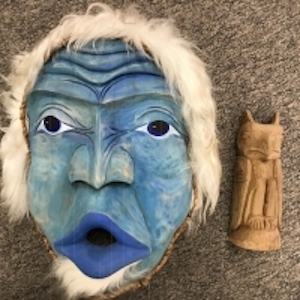WASHINGTON — U.S. Senator Brian Schatz (D-Hawai‘i), chairman of the Senate Committee on Indian Affairs, released a discussion draft of proposed legislation that would strengthen enforcement of laws against fake Native art.

In a statement, Schatz said the Indian Affairs committee is seeking public comment on the proposed Amendments to Respect Traditional Indigenous Skill and Talent (ARTIST) Act of 2023. The ARTIST Act would update the Indian Arts and Crafts Act to support creative economies and strengthen enforcement of current law and protections against counterfeit competition for Native artists and their works.
The discussion draft reflects direct stakeholder input as well as years of Committee oversight and broad commitment to the protection of Native cultural patrimony and revitalization of Indigenous languages, according to a news release.
Comments will be used to further inform the legislative process and serve as a resource for future discussions on updating the Indian Arts and Crafts Act. The deadline for comment submission on the discussion draft is April 14, 2023. Comments may be submitted to [email protected].
The marketing and sale of counterfeit Indian art and craftwork is an ongoing issue that tribes, state and federal officials continue to wrestle with in 2023.
Earlier this month, the Justice Department announced that a Houston man was sentenced to five years probation for mail fraud and misrepresentation of Indian Goods under the Indian Arts and Craft Act.
According to court documents, Kevin Charles Kowalis, 60, fraudulently marketed and sold jewelry online that he described as “Native American Indian Handmade,” “genuine Indian handcrafted,” “Zuni,” and “Navajo.” He had received the counterfeit jewelry from a manufacturer in the Philippines unaffiliated with any federally recognized Native American tribe.
On March 1, in two separate criminal cases, a pair of Washington artists pleaded guilty in Seattle to violations of the Indian Arts and Crafts Act by representing themselves as Native American artists, when they have no tribal enrollment or heritage. The men, 52-year-old Lewis Anthony Rath, of Maple Falls, Washington, and 67-year-old Jerry Chris Van Dyke aka Jerry Witten, of Seattle, falsely represented themselves as members of the San Carlos Apache Tribe and the Nez Perce Tribe, respectively. They will be sentenced on May 17, 2023.
“For those selling counterfeit Indian art and craftwork it is important to know that wherever you are we will diligently work to find and prosecute you under the Indian Arts and Crafts Act,” said Director Meridith Stanton of the U.S. Department of the Interior’s Indian Arts and Crafts Board.
More Stories Like This
Native News Weekly (August 25, 2024): D.C. BriefsUS Presidents in Their Own Words Concerning American Indians
Native News Weekly (January 18, 2026): D.C. Briefs
Federal Judge Orders ICE to Halt Use of Pepper Spray, Arrests of Peaceful Protesters in Twin Cities
Tunica-Biloxi Cultural Leader John D. Barbry Walks On
Help us defend tribal sovereignty.
At Native News Online, our mission is rooted in telling the stories that strengthen sovereignty and uplift Indigenous voices — not just at year’s end, but every single day.
Because of your generosity last year, we were able to keep our reporters on the ground in tribal communities, at national gatherings and in the halls of Congress — covering the issues that matter most to Indian Country: sovereignty, culture, education, health and economic opportunity.
That support sustained us through a tough year in 2025. Now, as we look to the year ahead, we need your help right now to ensure warrior journalism remains strong — reporting that defends tribal sovereignty, amplifies Native truth, and holds power accountable.
 The stakes couldn't be higher. Your support keeps Native voices heard, Native stories told and Native sovereignty defended.
The stakes couldn't be higher. Your support keeps Native voices heard, Native stories told and Native sovereignty defended.
Stand with Warrior Journalism today.
Levi Rickert (Potawatomi), Editor & Publisher

